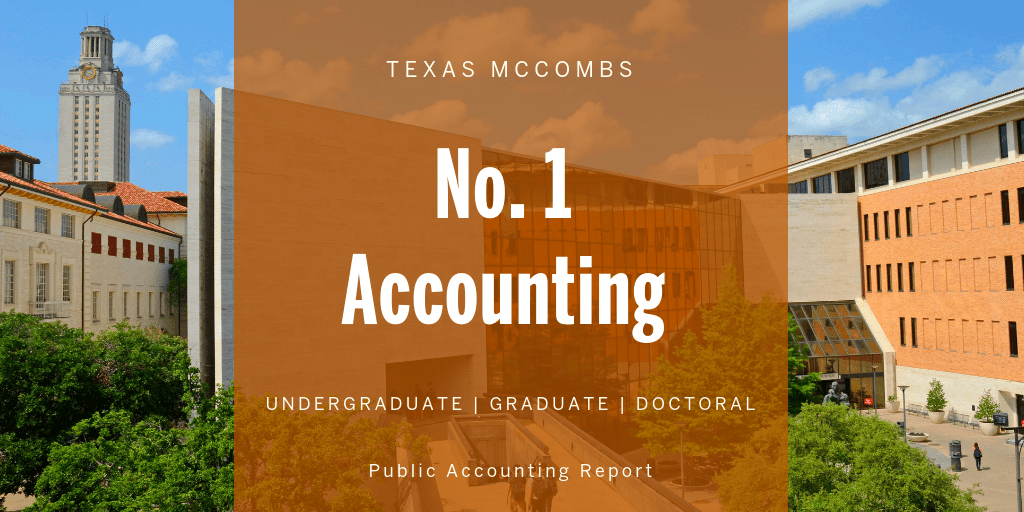Texas McCombs has once again taken first place in Public Accounting Report’s (PAR) undergraduate, master’s, and doctoral rankings. PAR ranks U.S. academic accounting institutions every year by surveying nearly 1,000 accounting faculty members across U.S. colleges and universities.

Master’s Ranking: No. 1
Texas McCombs has led the nation at the master’s level (Master in Professional Accounting) in 25 out of the past 26 surveys. This is also the 11th straight year the MPA program has clinched the top spot. BYU jumped ahead of Illinois to take second place this year, leaving Illinois in third.
Explore the undergraduate, graduate, and PhD rankings, as well as further accolades, on the Texas McCombs News blog.
— — — — — — — —
One reason the Department of Accounting and its programs continue to rank so high is due to our faculty (along with their research and curriculum). Read on to learn more about recent research and curriculum from our Department’s faculty.
Move Donors to the Head of the Transplant Line?
Accounting research demonstrates how a simple rule change could boost the number of usable organ donations — and save lives. Based on the research of Ronghuo Zheng.
 Awaiting an organ transplant for yourself or a loved one means delays that can be agonizing — and costly. Every day, 20 patients on U.S. waiting lists die before an organ becomes available, according to the U.S. Department of Health and Human Services.
Awaiting an organ transplant for yourself or a loved one means delays that can be agonizing — and costly. Every day, 20 patients on U.S. waiting lists die before an organ becomes available, according to the U.S. Department of Health and Human Services.
In a sense, it’s a classic accounting problem of supply and demand, says Ronghuo Zheng, assistant professor of accounting at Texas McCombs. While 113,759 U.S. patients languished on lists last year, only 17,554 donors, living and deceased, provided organs.
How can the U.S. expand its supply? In new research, Zheng finds that with one important modification to a Nobel laureate’s proposed rule, it could swell the pool of donors while ensuring that patients get usable organs.
The proposal, known as the donor priority rule, would hold out a carrot to potential registered donors. If one of them gets sick themselves and needs a transplant, they’ll be able to cut in line, taking priority over those who aren’t registered.
>> Continue reading on Big Ideas
— — — — — — — —
Patrick Badolato, Senior Lecturer at Texas McCombs, recently posted an article on LinkedIn regarding his Financial Statement Analysis class and how it correlates to real world companies.
An Update on Uber, Financial Accounting, Financial Statement Analysis and Cash Flow Bros
In addition to the Uber commentary at the end, I offer this post as a quick update for any interested former students or colleagues (I hope you are doing well!) and as some quick thoughts for anyone who just started or may take any of these classes at the University of Texas’s McCombs School of Business.
 This Fall our Department asked me to teach the four classes of the (introductory) Financial Accounting class to our Full-time MBAs in addition to six sections of Financial Statement Analysis (across 5 of our graduate programs). While this uniquely high course load will be an incredible challenge, I am absolutely excited to have this opportunity, which began this past week.
This Fall our Department asked me to teach the four classes of the (introductory) Financial Accounting class to our Full-time MBAs in addition to six sections of Financial Statement Analysis (across 5 of our graduate programs). While this uniquely high course load will be an incredible challenge, I am absolutely excited to have this opportunity, which began this past week.
As my former students and colleagues know, the course I have focused on and developed over the past many years is not introductory accounting, but Financial Statement Analysis (FSA). I have had the pleasure of teaching this upper-level class in all of the McCombs graduate programs that include accounting classes. In this class we have covered Starbucks, JCPenney, Nordstrom, Apple, Ford, Tesla, Amazon, Netflix, Walmart, Whole Foods, Facebook, Priceline, Southwest, Coca-Cola, Disney, ToysRUs, Theranos, Groupon, Square, Blue Apron, GoPro, Yeti, Exxon, Beyond Meat, Lyft, etc. After taking FSA, students note that they appreciate how the class helps them: (1) see how and why valuation and analysis are more than mindless mechanical processes; (2) understand the importance of stepping back and understanding the business; and (3) offers the opportunity to see that there is a ton of information in financial reports, once we gain comfort working past the fluff and filler and focus on holistically using the financial statements and other information.
Learn more about the FSA class by reading Patrick Badolato’s full article



 Awaiting an organ transplant for yourself or a loved one means delays that can be agonizing — and costly. Every day, 20 patients on U.S. waiting lists die before an organ becomes available, according to the
Awaiting an organ transplant for yourself or a loved one means delays that can be agonizing — and costly. Every day, 20 patients on U.S. waiting lists die before an organ becomes available, according to the  This Fall our Department asked me to teach the four classes of the (introductory) Financial Accounting class to our Full-time MBAs in addition to six sections of Financial Statement Analysis (across 5 of our graduate programs). While this uniquely high course load will be an incredible challenge, I am absolutely excited to have this opportunity, which began this past week.
This Fall our Department asked me to teach the four classes of the (introductory) Financial Accounting class to our Full-time MBAs in addition to six sections of Financial Statement Analysis (across 5 of our graduate programs). While this uniquely high course load will be an incredible challenge, I am absolutely excited to have this opportunity, which began this past week. In recent years, one of the major exports of U.S. businesses has been cash. Several reports, such as one by
In recent years, one of the major exports of U.S. businesses has been cash. Several reports, such as one by 